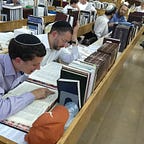Chayei Sara
Rabbi Goldberg’s tweet described my feelings this week: “reeling from the deep and profound loss of Rabbi Sacks zt”l.” The impact was in part the suddenness: two months ago Rabbi Sacks was giving interviews about his recent book Morality; a month ago, his illness was announced; on Shabbos, he left this world.
But beyond the speed of the decline, the shock this week was that I had not realized how deeply Rabbi Sacks had impacted me.
But beyond the speed of the decline, the shock this week was that I had not realized how deeply Rabbi Sacks had impacted me. In his eulogy, Rabbi Harvey Belovski of the Golders Green synagogue observed, “All modern Jews are students of Rabbi Sacks, whether they know it or not, whether they acknowledge it or not, or whether they like it or not.”
So this newsletter is my response to his passing. My plan is to write something each week about the parsha, or the Jewish world. Original insights? I can’t come up with them every week. And my writing is rusty for anything longer than Whatsapp. And what a long time it has been since I have tried my hand at the essay form. But this is what there is.
So here we go.
It was over twenty years ago — in the old Bogrim shul at Mizrachi Melbourne (since then spruced up and now the Beit Midrash) — that I heard Rabbi Sacks share the following thought about Chayei Sara.
Abraham returns from the binding of Isaac and begins to negotiate with the Hittites, specifically Ephron, to buy a burial plot for his wife Sarah. When their exchange begins Abraham describes himself as גר ותושב אנכי עמכם: “I am a stranger and a resident among you,” to which the local population respond: שמענו אדני, נשיא אלקים אתה בתוכנו: “Listen to us, Sir. You are a prince of God in our midst.” (Genesis 23:4 and 6)
Rabbi Sacks contrasted this with last week’s parsha, when Lot pleaded with his neighbours in Sodom to leave his guests unmolested. The Sodom locals dismiss Lot: “This one man came here as an immigrant, and now all of a sudden, he has set himself up as a judge! We’ll give it to you worse than to them!” (Gen 19:9)
Jews seek to become part of their host societies in two ways, said Rabbi Sacks. Some try Lot’s way: assimilation. Like Lot tried to set himself up as a judge, these Jews seek to ingratiate themselves and assimilate; this always fails. Abraham, by contrast, has no illusions. He considers himself a stranger and a resident. But being conscious of the difference between him and the Hittites is precisely what brings them to acknowledge Abraham’s uniqueness: “You are a prince of God in our midst!” Likewise, it is when Jews retain their distinctiveness, that gentiles value Jews and their distinctiveness.
That’s all for this week. And friends, remember: whatever the world throws at you, stay strong.
